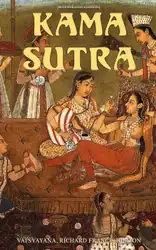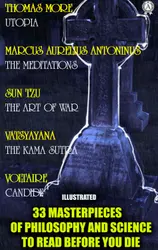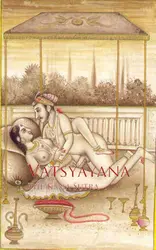Delve into a world of passion, philosophy, and profound understanding of human relationships with the 'Kama Sutra,' an anthology masterfully capturing the timeless narrative of love and erotica. This collection, edited with precision and care, navigates the delicate interplay of spirituality and sensuality, presenting readers with a diverse tapestry of literary styles ranging from poetic reveries to pragmatic expositions. As a seminal piece in world literature, the 'Kama Sutra' transcends mere instruction and emerges as a holistic treatise in pursuit of happiness, offering insights that resonate across time and cultures. The authors, Vatsyayana and Richard Francis Burton, infuse the anthology with their rich cultural and historical contexts. Vatsyayana, a sage from ancient India, articulates the philosophical foundations of human relationships, while Burton, a renowned British explorer and linguist, provides a Western lens, bridging cultures and enhancing accessibility. Together, these authors weave a narrative that encapsulates the evolutionary discourse of intimacy within the societal constructs of their respective eras, making the anthology not just a literary venture, but a cultural dialogue that explores the ethos of human connectivity. This anthology is a compelling recommendation for anyone eager to explore a multitude of perspectives and styles in one volume, providing more than mere intellectual entertainment. It serves as an educational odyssey, enriching the reader's understanding of personal and interpersonal dynamics while fostering a multifaceted dialogue between its varied voices. A journey through the 'Kama Sutra' is not only an exploration of ancient wisdom but also a reflective engagement with enduring human themes, making it an indispensable addition to any literary exploration of love and desire.

Kamasutra with Sexual Positions
Vatsyayana
book
Kama Sutra (The annotated original english translation by Sir Richard Francis Burton)
Vatsyayana, Richard Francis Burton
book
Kama Sutra (Illustrated Edition) : An Ancient Indian Treatise on Love, Life and Society For Adult Readers
Vatsyayana, Richard Francis Burton
book
The Kama Sutra of Vatsyayana
Vatsyayana
book
Kama Sutra (Illustrated Edition) : An Ancient Indian Treatise on Love, Life and Society For Adult Readers
Vatsyayana, Richard Francis Burton
book
33 Masterpieces of Philosophy and Science to Read Before You Die (Illustrated) : Utopia, The Meditations, The Art of War, The Kama Sutra, Candide
Thomas More, Marcus Aurelius Antoninus, Sun Tzu, Vatsyayana, Voltaire, Edwin A. Abbott, Aristotle, Dale Carnegie, Gilbert Keith Chesterton, René Descartes, Epictetus, Sigmund Freud, Hermann Hesse, David Hume, Lao Tzu, David Herbert Lawrence, Niccolò Machiavelli, John Mill, Prentice Mulford, Friedrich Nietzsche, Plato, Bertrand Russell, H.G. Wells, Frances Bacon
book
LUST Classics: Kama Sutra
Vatsyayana
book
The Kama Sutra
Vatsyayana
audiobookbook
Kama Sutra : The keys to Love and Sexuality
Vatsyayana, A to Z Classics
book
The Kama Sutra (annotated)(Best Navigation, Active TOC) (Prometheus Classics)
Vatsyayana, Prometheus Classics
book
The Kama Sutra : Bestsellers and famous Books
Vatsyayana
book
